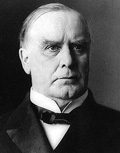 |
William McKinley
b. 29 Jan 1843, Niles, Ohio
d. 14 Sep 1901, Buffalo, New York |
| Title: |
President of the United States |
| Term: |
4 Mar 1897 - 4 Mar 1901 |
| Chronology: |
10 Feb 1897,
election to the office of President of the United States is declared upon counting electoral votes (cast 11 Jan 1897),
joint session of the Senate and House of Representatives, House Chamber, U.S. Capitol, Washington, D.C. [1] |
|
4 Mar 1897,
commencement of term |
|
4 Mar 1897,
took an oath of office as President of the United States, inaugural ceremony as part of the special session of the Senate, in front of the original Senate Wing of U.S. Capitol, Washington, D.C. [2] |
|
4 Mar 1901,
expiration of term |
| Term: |
4 Mar 1901 - 14 Sep 1901 |
| Chronology: |
13 Feb 1901,
election to the office of President of the United States is declared upon counting electoral votes (cast 14 Jan 1901),
joint session of the Senate and House of Representatives, House Chamber, U.S. Capitol, Washington, D.C. [3] |
|
4 Mar 1901,
commencement of term |
|
4 Mar 1901,
took an oath of office as President of the United States, inaugural ceremony as part of the special session of the Senate, East Portico, U.S. Capitol, Washington, D.C. [4] |
|
14 Sep 1901, died (as a result of assassination attempt) [5] |
| Biography: |
| Attended the public schools, Poland Academy, and Allegheny College; teacher; served in the Union Army, Ohio Volunteer Infantry, 1861-1865; promoted second lieutenant for his bravery in the Battle of Antietam (1862); discharged a brevet major in 1865; lawyer, private practice; prosecuting attorney of Stark County, Ohio, 1869-1871; supported Rutherford Birchard Hayes for governor of Ohio in 1867 and Ulysses S. Grant for president in 1868; elected as a Republican to the 45th and to the two succeeding Congresses (4 Mar 1877 - 4 Mar 1883); chair, Committee on Revision of the Laws (47th Congress); presented credentials as a member-elect to the 48th Congress and served from 4 Mar 1883 until 27 May 1884, when he was succeeded by Jonathan H. Wallace, who successfully contested his election; again elected to the 49th and to the two succeeding Congresses (4 Mar 1885 - 4 Mar 1891); chair, Committee on Ways and Means (51st Congress); unsuccessful candidate for reelection in 1890 to the 52nd Congress; delegate to the Republican National Conventions in 1884, 1888, and 1892; Governor of Ohio (11 Jan 1892 - 13 Jan 1896); elected President of the United States in 1896; called a special session of Congress to revise customs duties upward (Dingley Tariff, 24 Jul 1897); after the mysterious sinking of the U.S. battleship "Maine" (15 Feb 1898) in the harbor at Havana, Congress authorized armed intervention in Cuba to help the struggle for independence from Spain (declaration of war on Spain effective 21 Apr 1898); Spanish forces defeated in Cuba and on the seas; Spain renounced all claim to Cuba, ceded Guam and Puerto Rico to the United States, and transferred sovereignty over the Philippines to the United States for $20 million (Treaty of Paris, 10 Dec 1898); renominated by the Republicans without opposition and reelected president in 1900; shot by an anarchist at a public reception in the Temple of Music in Buffalo, New York, on 6 Sep 1901; despite early hopes for recovery, died on 14 Sep 1901, in Buffalo, New York. |
| Biographical sources: Biographical Directory of the United States Congress (2005); The New York Times, New York, Saturday, September 14, 1901, vol. L, No. 16,127, p. 1 (obituary). |
| Elections: |
| Candidate |
Electoral vote (11 Jan 1897) |
| William McKinley |
271 |
| William Jennings Bryan |
176 |
| total number of electors appointed |
447 |
| number of votes for a majority |
224 |
| Candidate |
Electoral vote (14 Jan 1901) |
| William McKinley |
292 |
| William Jennings Bryan |
155 |
| total number of electors appointed |
447 |
| number of votes for a majority |
224 |
|
| Source of electoral results: Congressional Record, 54th Congress, 2nd Session, 1715; Congressional Record, 56th Congress, 2nd Session, 2371-2372.
|
| |
| [1] |
Congressional Record, 54th Congress, 2nd Session, 1715-1716. |
| [2] |
Congressional Record, 55th Congress, Special Session of the Senate, 1-5. |
| [3] |
Congressional Record, 56th Congress, 2nd Session, 2371-2372. |
| [4] |
Congressional Record, 57th Congress, Special Session of the Senate, 1-3. |
| [5] |
The New York Times, New York, Saturday, September 14, 1901, vol. L, No. 16,127, p. 1. |
|
Image: photograph (1900). |